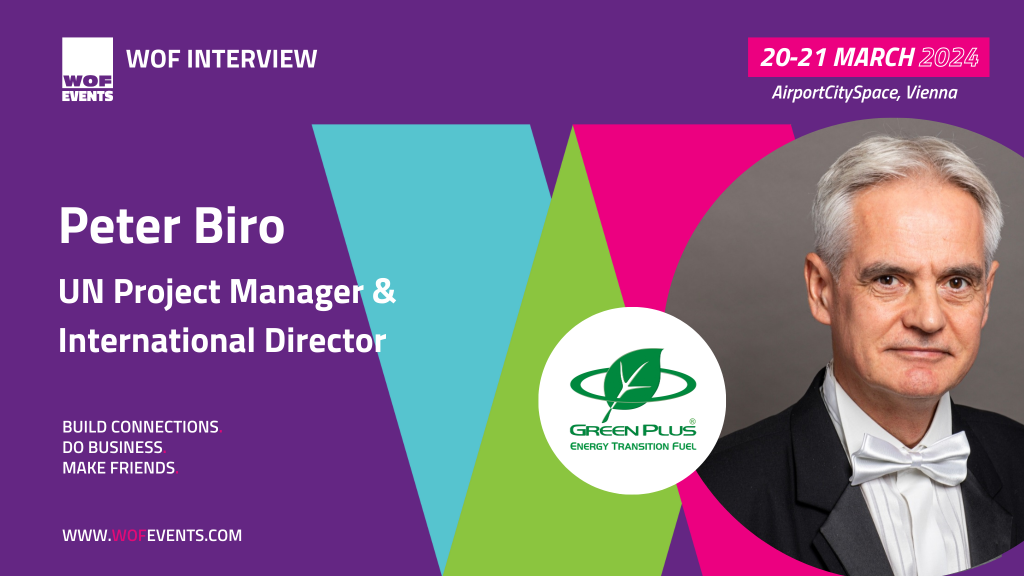Interview with Peter Biro, UN Project Manager & International Director of Green Plus Group
Peter Biro is a seasoned professional with a rich history in environmental advocacy and sustainable initiatives. His journey began in 2003 when he joined Green Plus Group as an expert in fuel consumption and emission testing within Biofriendly Corporation. In 2006, Peter founded the Association of Climate-Friendly Municipalities, showcasing his commitment to fostering environmentally responsible practices at the local level. His dedication to this cause led to him serving as the President of the Board of the Association from 2006 to 2010 and later as Vice President, President, and Vice President again from 2008 to 2019. In 2019, Peter took on the role of Director at Green Plus Group, where he currently serves as the Project Manager of the UN Energy Transition Fuel World Program.
Biofriendly Corporation’s mission is to address air pollution and the increasing demand for green fuel. How does the Green Plus® liquid combustion catalyst contribute to this mission, especially in the logistics industry?
I am proud about our development of more than 100 environmental patents. Our mission since 2004 has been to meet climate protection policies, by engaging in cleaner air projects, and zero-emission municipality projects. GREEN PLUS® Liquid Combustion Catalyst has been an approved fuel additive in the Ultra Low Emission Diesel Law TCEQ TxLED since 2005. It is now available in the new green category as the eco-labeled energy transition fuel certificate by the United Nations with the utility of this catalyst to achieve the sustainable development goals of the Paris Agreement. So, as the supply chains are pushed to become more and more sustainable to comply with the new regulations and customers’ expectations, utilizing Green Plus® helps to achive those “green” goals in terms of ESG and EEO guidelines, EEO meaning Energy Efficiency Obligation of Energy Saving Policy in the EU. The providers have to prove the economy of energy using, what’s more the energy saving of natural gas, fuel and electricity.
Could you briefly elaborate on the key advantages of Green Plus® liquid combustion catalyst for transportation companies regarding cost savings and environmental benefits?
The Green Plus® has many advantages and unquestionably lowers the cost of transport. We know more than a thousand solutions that can have a similar effect, but majority of them cause harmful side effects. Our EPA-registered environmentally friendly GREEN PLUS® catalyst can help ignition and combustion on a particular level, hence reduce the fuel burning’s smog by between 50% and 99%. But how is the smog reduction related to cost reduction, you might ask? Well if we reduce the possibility of incomplete burning and its result is less smoke and smog, then we reduce the waste of energy and fuel use, reducing the fuel cost while improving the air quality at the same time. Our statistics show between 7% and 32% fuel savings depending on a particular loading.
Another benefit, that cannot be left unnoticed, is a higher technical safety of engines and therefore less maintenance costs when using our additive. With over 20-30 years of experience in laboratory and operational tests and use, we can state today that GREEN PLUS® gives an extra 10 or 20 years for the engine, an additional 1 million kilometers, or an extra 100,000 operational hours. Those are surely not some unsignificant numbers there.
We have to mention the risks of the weather circumstances that can cause losses on assets. As it happens, the extra cold temperature blocks the right ignition of the fuel in the engine, but with our catalyst using, it is much easier and more stable. Also, the overloaded engine suffers from extra hot temperatures and can cook the engine mainly upwards and uphills. Our solution reduces the overheating.
Another advantage is the fuel conditioning and fuel fixing. The new environmental regulations for engines make them much more sensitive to fuel quality. The GREEN PLUS® sort of “heals” the fuel if it is of a terrible quality, and thus protects the injectors, particular filters, catalysts, and the total system from the fuel tank to the exhaust pipe in a very soft and efffective way.
That sounds like a true win-win for a green logistics player. Nevertheless is it somehow possible to monetize how Green Plus® provides a cost-effective and sustainable solution for logistics companies striving to balance these factors?
Of course. Simply put, 1 euro investment into GREEN PLUS® brings 2 euros profit if we only consider fuel saving. One should point out, that as an additive, using Green Plus® does not harm the fuel contracts or guarantee contracts and what’s more, if any other additive is a must or a preference, GREEN PLUS® can always be used on top.
Significant is the proven lower CO2 footprint and better air quality. Countries and companies that have been using our product, report 7% CO2 and GHG reduction and thus improved energy efficiency number by 7%. That kind of check for each eco label is done and controlled by EPA and UN labs and institutes annualy. So as a consequence, such green approach has helped some companies to win important tenders which I believe, finatially-wise, can be even more crucial and much more impactful than simply cutting the fuel costs.
Can you share any real-world success stories or case studies where GREEN PLUS® has made a significant difference for logistics businesses regarding reduced emissions and fuel consumption?
Unfortunately, most famous fuel and transportation companies keep utilization of our product as secret due to competition. But what we can share, for example, is the Texas Air Quality Program, where some logistics companies deal with us to distribute and transport the GREEN PLUS® Catalyst to refineries or to fuel stations to meet the TCEQ TxLED standards. This program’s rigorous official monitoring over the last 18-20 years, showed cleaner air with less emission and improvement in 35% of the population’s health condition, e.g. less asthma, allergy, strokes, cancer, and mortality.
DB Arriva test with 1400 buses showed between 8% to 16% fuel saving in London. Locomotives of the Deutsche Bahn were successfully tested with a 10% reduced fuel consumption as a result. A strict test with Rail Cargo Locomotives showed the same effect and an 80% smog reduction, which resulted in a long-term contract.
The list is long, outcomes great and the demand for our product has increased rapidly. Since last year’s end, 20 billion liters of fuel treatment by GREEN PLUS® Catalyst has been used. It was the highest-performing order per year historically.
As the demand for greener and more sustainable logistics practices grows nowadays and there is a transition towards electromobility, would you say that eco fuels still have a future in the long term and why?
We thought the global transition to electromobility would be complete in 2012. The money stood ready, but the structure and the intention did not. The oil lobby is powerful. So, as the regulations were often postponed, the engine factories developed better engines and expanded the market with hybrid solutions.
The shift has turned out to be a very slow and complex process. That is the reason for the foundation of the ETF Energy Transition Fuel World Program by the United Nations. The recognition that it is inevitable to involve the oil companies created the hand-in-hand program of a greener fuel world.
As an ambassador of the Climate Friendly Municipalities I find it necessary to keep on developing all alternatives such as the electric, hydrogen, magnetic, air compressed, resonance, quantum, nuclear, etc. energy drivers in mobility. Nevertheless, I think we should also adopt a this cheap sustainable fuel solution GREEN PLUS® Catalyst, which shows visible, fast, significant, and certified results already today.
Collaboration often plays a vital role in driving sustainability initiatives. Please tell us more about Biofriendly’s partnerships with logistics industry stakeholders and how these collaborations advance sustainable solutions in the CEE region.
It is a dilemma for me. My goals include prioritizing strategic long-term contracts with governments to ensure real, followable emission reduction. The effect of the United Nations ETF world program has, however, slowed down in EU due to COVID-19 and Ukraine issues. The non-EU countries can laugh at the EU’s inability to push the agenda through and use this advantage ahead in competitiveness.
When it comes to the national regulation for ETF green fuel use and approach towards it by companies, it is evident that the West and North of Europe adopts environmentally friendly solutions much more than in the CEE, where the cheapest kilometers remain the priority. Obviously, we still have to educate the leaders in our region that CO2 reduction and fuel saving equals 1:1.


